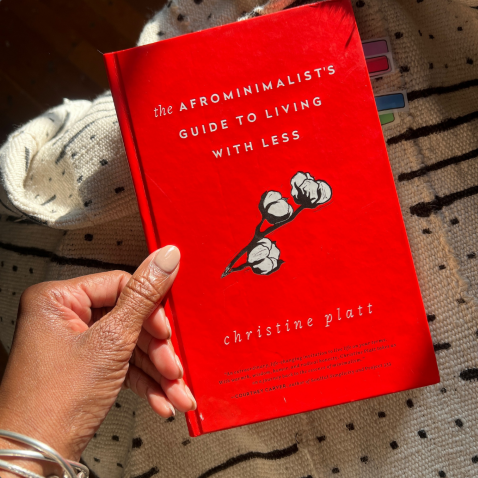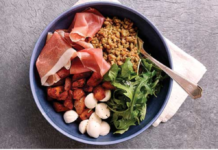By Sarah Enelow-Snyder/Originally published by thegrio
In Black American homes, objects can hold great significance. Historically, enslaved people, considered to be possessions themselves, were largely prohibited from having possessions of their own. During Jim Crow and well into the civil rights movement, it was still difficult to save enough money to make special purchases, and many stores didn’t serve Black clientele. If we are our ancestors’ wildest dreams, our ancestors may have dreamed that today, we would have the freedom to buy lots of nice things.
However, there’s a growing movement to do just the opposite. Loosely defined as the pursuit of simplicity, author Christine Platt has introduced many Black people to minimalism, including theGrio’s own Panama Jackson. Platt’s 2021 book, “The Afrominimalist’s Guide to Living With Less,” outlined her personal journey to minimalism and gave readers a framework to begin their own — even in a society that celebrates consumption. Among key steps Platt suggests are admitting that you have too much stuff, forgiving yourself for it, taking an inventory (however agonizing that might be), letting go of the things you don’t need, use, and love — and lastly, paying it forward through gifts and donations.
Platt began pursuing minimalism back in 2016 when she left her job as a policy advisor at the U.S. Department of Energy to become a writer. Suddenly going from working in an office to spending her days at home, she was forced to confront her material goods, among them a wealth of clothes, shoes, and accessories. She even went so far as to heat-map her four-bedroom, three-bathroom house and found that between herself, her then-husband, and her daughter, much of the square footage was hardly being used. Taking inventory proved essential when she later went through a divorce that led to downsizing from a single-family house to a condo.
As she pared down her belongings, Platt decided to take a Black-centric approach, a process she found offered emotional and financial benefits. Freeing up mental space as well as money that could be saved, for example, to create generational wealth, is something that often feels out of reach for many Black families. Additionally, instead of turning her home into a bland, neutral, stereotypically minimalist space, Platt’s approach was deeply personal; she opted to honor her heritage and the African diaspora by showcasing colorful Ankara pillows and mudcloth. She even held onto a jar of raw cotton that reminded her to thank her ancestors.
“It doesn’t matter if I make my house look like this barren Pinterest square if it’s not going to make me happy,” Platt noted.
Beyond the labor of paring down, Platt also asked herself some fundamental questions, like why she enjoyed bargain shopping so much in the first place. “Why do I get this euphoric feeling when I find something on sale, but by the time I get home, I don’t want to wear it?” she asked.
Understanding that our lives can be just as cluttered as our homes, Platt has a new lifestyle book forthcoming in 2025, “Less Is Liberation,” that’s intended to help readers improve other areas of life beyond their homes. “Minimalism is the gateway to living with intention,” Platt told theGrio, adding that she could imagine calling herself the “Afrointentionalist.”
In “Less Is Liberation,” Platt wants to encourage readers to apply this kind of self-assessment not just to clutter, but to habits, behaviors, and beliefs. “Why do I go to the mall instead of going to yoga when I’m stressed?” she asked as an example. Platt wants to pinpoint where these narratives come from and what needs to change in order for us to make more intentional choices.
As a result of her own self-interrogation, Platt’s approach to minimalism has evolved over the years. “I’ve come to appreciate, and almost welcome, loss and letting go,” she said. Acknowledging that Black people may have difficulty releasing certain objects because ownership often connotes a sense of power historically withheld from marginalized communities, Platt noted that, besides objects, sometimes we hold onto people and situations longer than we should due to an ingrained fear of loss.
Neverthless, as readers approach her with well-worn copies of “The Afrominimalist’s Guide” that have been tagged and dog-eared from repeated use, it is clear the Afrominimalist community is growing, said Platt. “I have people doing the work generationally. They’re doing it with their siblings and parents,” she explained. “Inherited clutter is a big part of it.”
Along with self-declared Afrominimalists, a new group of enthusiasts has emerged. Platt was tagged in a Facebook group of Black female homesteaders, members of which had read the Guide and wanted to apply its principles to their rural, self-reliant, sustainable lifestyle. The group includes single women, families, and empty-nesters, she said, all pursuing a life with less.
“Many of us are first-gen in the sense that we have an opportunity to change the legacy of our family lineage, and it’s been really beautiful to see more and more Black and brown folks embrace that,” Platt said.
“Less Is Liberation” is forthcoming in 2025 from Balance, an imprint of Grand Central Publishing. In the meantime, get started on your minimalism journey with “The Afrominimalist’s Guide to Living With Less.”
Corrected: Monday, 05/06/24 at 3:35 p.m. E.T.: An earlier version of this article misstated that “Less Is Liberation” will be Christine Platt’s second book. Platt has, in fact, authored multiple books for children and adults. The article has been corrected to reflect that this will be her second release in the lifestyle genre.



































